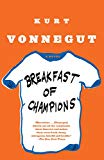
Breakfast of Champions tells the story of Kilgore Trout, an unpopular science fiction writer who travels to Midland City to speak at a convention. Before the convention, a car salesman named Dwayne Hoover goes insane after reading Trout's book written from the perspective of the Creator of the Universe. Hoover goes on a killing rampage and the narrator of the novel frees Kilgore Trout. The book is written from the perspective of a zany omniscient narrator who satirizes modern society, culture and the human race.
Suicide, free will, mental illness, and social and economic cruelty are dealt with throughout the novel. In the preface, Vonnegut states that he tends "to think of human beings as huge, rubbery test tubes, too, with chemical reactions seething inside." As with Slaughterhouse-Five (1969) and The Sirens of Titan (1959), the nature of free will is called into question, in this case by considering mankind as biological machines, and physical measurements of characters are often given when they are introduced. He attributes the mental illness of Dwayne Hoover and society at large to an abundance of "bad chemicals" in the brain which, when combined with bad ideas, formed "the Yin and Yang of madness." This idea, that humans are no more than machines, is contained within the novel Kilgore Trout gives to Dwayne Hoover. Both Trout and Vonnegut realize the power of bad ideas, with Vonnegut remarking how "natural it was for [people] to behave so abominably, and with such abominable results: They were doing their best to live like people invented in story books. This was the reason Americans shot each other so often: it was a convenient literary device for ending short stories and books." The view of humans as biological machines, initially accepted by Vonnegut, is counteracted by Rabo Karabekian, the abstract artist who suggests "Our awareness is all that is alive and maybe sacred in any of us. Everything else about us is dead machinery."
The novel is critical of American society and its treatment of its citizens, many of which Vonnegut writes "were so ignored and cheated and insulted that they thought they might be in the wrong country." He focuses largely on race, the poor, and the destruction of the environment, criticizing the hypocrisy of a land that claims to be based on the principles of freedom having been founded by people who "used human beings for machinery, and, even after slavery was eliminated, because it was so embarrassing, they and their descendants continued to think of ordinary human beings as machines."
Already have an account? Log In Now